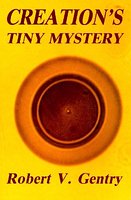|
Earth Science Associates |
||||||||
|
|||||||||
|
Creation's Tiny Mystery |
|||||||||
|
|
Discounting the EvidenceAfter recounting my testimony (which he garbles), Lewin refers to my cross-examination by ACLU Attorney Bruce Ennis and focuses on my motivation as if it were a detriment to my work: In 10 minutes of cross-examination Ennis showed that the principal motive for Gentry's work was his literal reading of the Bible—in particular, Genesis. . . . (Lewin 1982b, 146) More precisely, Ennis' question about my motivation was in reference to one of the Ten Commandments: Q Isn't one of the primary reasons that you began to rethink the entire issue of evolution and creation is because of the moral perspective of the Fourth Commandment? (Merkel 1981; Appendix—l. 28 to l. 30)Early in this book I discussed how my complacent acceptance of theistic evolution was shattered when I realized this Commandment refers to the six days of creation in the context of six literal days; thus my response to this question was, "Absolutely." The reader may wonder why Ennis chose to ask this question. What did it have to do with the issues before the court? The problem was that the ACLU had no way of directly countering the published scientific evidences for creation which I had discovered. So during my cross-examination Attorney Ennis steered clear of challenging my claim that polonium halos in Precambrian granites represent evidence for creation. To obscure his inability to confront this evidence required that he somehow try to discredit me, or some facet of my work. As a matter of tactics, he utilized two separate [p. 151] strategies. First, as we have just noted, he focused on my motivation — it was almost as if the ACLU would like to have blamed the existence of polonium halos in granites on my motivation. Ennis' second strategy was to raise doubts about my credibility as a scientist. To accomplish this he referred to the superheavy element report mentioned earlier in Chapter 6. This was no surprise as I had fully expected the ACLU would do this in an attempt to undermine the credibility of my results pertaining to creation. A considerable surprise, however, was Lewin's recounting of this phase of my cross-examination. There appeared to be serious variances between what I remembered and what was reported. Yet for over four years after the trial I was unable to challenge Lewin's version of this phase of the trial because my testimony had never been transcribed. Fortunately, the required information was obtained just in time to be included in this book. For the sake of chronological order my comments about this important material are deferred until near the end of this chapter. Lewin's second write-up closes with the following comment: The combined testimony of the creationists' scientific witnesses was, it has been acknowledged, not impressive. Anyone who was hoping for a body of science to stand in equal force against conventional evolutionary biology, and the background of geology, chemistry and physics, would have been disappointed. (Lewin 1982b, 146) Who acknowledged that the combined testimony of the creationists' scientific witnesses was not impressive? Roger Lewin? The ACLU witnesses? This was the theme of the ACLU case. Thus Lewin permits the ACLU itself to pass judgment on evidence for creation presented at the trial. Then Lewin assumes the role of final arbiter of the trial; he pictures supporters of creation science as a disheartened lot because their position could not withstand the force of evolutionary evidence. I grant there was much disappointment about the trial. But was it because of lack of evidence for creation or because it wasn't accurately and fully reported? Lewin's brief discussion of my testimony would have been the opportune time to describe the pivotal granite synthesis experiment. By synthesizing a piece of granite in the laboratory, evolutionist scientists could in theory falsify my creation model and show their uniformitarian principle to have some basis in fact. An explanation of the falsification test by Lewin would have enabled other scientists to see that my testimony had a credible scientific foundation. But in his write-up, my deduction about granites being [p. 152] primordial, created rocks appears to be left hanging, as if it could not be tested. The creation model I proposed as a scientific framework to incorporate the evidences for creation and the flood is not mentioned. [The creation model presented later to the American Association for the Advancement of Science symposium (see Chapter 14) is similar to the one presented at the trial.] As a result, my testimony at the Arkansas trial is placed in the framework of a religious ad hoc hypothesis without scientific merit. Lewin's silence about my credentials portrays me as a scientist outside or, at best, on the fringes of the scientific community, rather than one who had carried on recognized scientific research for sixteen years. If he had forthrightly admitted that I had published evidence for creation and the flood which had not been refuted (even though a challenge to refute it had been in the scientific literature for several years), this would have shed a different light on my participation at the trial. But this did not happen, and the readers of Science were left with the impression that creation science was indefensible.
|
|
||||||
|
|
|||||||||
|
|||||||||
|
Earth Science Associates
|
|||||||||


